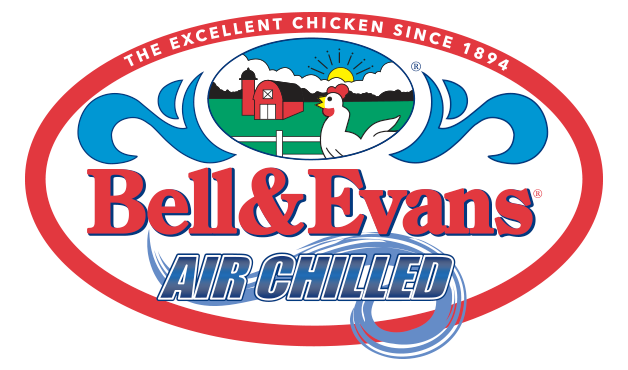Since Brexit, the U.S. and U.K. have been talking about a trade deal. One of the biggest disputes is regarding American chicken! Europe doesn’t want American chicken because of a process called “water chilling” that most U.S. poultry producers use…not Bell & Evans though. We use 100% air chill to cool our chickens.
In chicken production, after slaughter, the chickens’ live body temperature must be cooled from nearly 100° to 40° (or less) per USDA regulations. The quickest and cheapest way to do this is by submerging the chickens into large, open-top vessels of cold water – the entire cooling process taking only about an hour. When you cool hundreds of thousands of birds a day this way, recycling the same water over and over again within the same vessels, you need to add a disinfectant agent to the water, such as chlorine, to kill off harmful bacteria. More than 95% of American chicken is processed using this method, and it’s a process banned in the U.K. American chicken has been banned in the EU since 1997 because of water chilling, and the U.K. doesn’t want to lower their food standards now to accept American chicken through this trade deal.
Even more concerning, the USDA no longer limits the amount of excess water retained in a chicken during processing. The mandate states that the product must be prominently labeled with “retained water” or “absorbed water” and the correct percentage stated. But who knows if this practice is being monitored. Prior to 2003, the USDA mandated a maximum moisture pick-up of 12%, and, if any higher, chickens had to drain until they were below the 12%.
There’s another – a better – way to cool chickens. In 2005, I built the first 100% Air Chilled chicken facility in the U.S. So, I have to side with the U.K. on this debate. I learned of the air chill method during my visits overseas to find manufacturing processes that would produce the best chicken possible. After I learned there was a better way, I set out to do what’s best for my customers. It’s more expensive to build an air chill system and it slows down the cooling process – our process takes about three hours to move chickens through two miles of track – but in return, our chickens become more tender, retain their natural juices without being diluted by water, experience less human handling and taste much better!
Europe’s biggest gripe about water chilling is that they think it allows American producers to take shortcuts in animal welfare like overcrowding and unsanitary living conditions, among other things. They say heavily soiled birds are unacceptable and relying on a disinfectant bath prior to processing doesn’t cut it. I feel that US standards overall allow for poor animal welfare. Air chilling is not the only European standard we follow at Bell & Evans. In fact, we have our own defined “Humane Animal Welfare Standard” that aligns, and often exceeds, standards in Europe for chicken production. I’ll explain more about that in a future post.
The bottom line is that most US producers use cold water chlorine baths for four reasons: it’s faster, it’s cheaper, it’s effective in killing microorganisms, and it increases the weight of the chicken (the consumer pays for that absorbed water weight). Know that there is a better way, and Bell & Evans has it in our 100% air chill method – it’s better for the chickens, the environment and the consumers. Beware of others claiming to use air chill, as they are likely using a hybrid method that combines water chilling with air chill. Or, it’s likely that they are only air-chilling a small fraction of their actual output. Upgrading to an air chill facility is not a cheap or quick switch, so be wary of any company trying to tell you otherwise.
Learn more about Bell & Evans 100% Air Chill method here.
Some of the articles addressing chlorinated chicken, for reference:
https://www.cnbc.com/2017/07/25/us-uk-trade-chlorinated-chicken-fox-ross.html


Removed frozen skinless/boneless B&E chicken breast’s and immediately smelled chicken. As this never happ was before I wonder if it’s safe to eat. Please advise.
Our Customer Service Team tried to reach out to you. Can you please send us more information through our Contact Us page or give us a call at 717-865-6626 to talk to our Customer Service Representative?